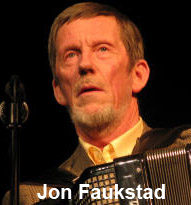 An interview with Toralf Tollefsen's daughter Sonja Marie Tollefsen (S.M.) at her home in Oslo by Jon Faukstad (J.F.). An interview with Toralf Tollefsen's daughter Sonja Marie Tollefsen (S.M.) at her home in Oslo by Jon Faukstad (J.F.). Published 26 February 2016. Pictures from accordions.com picture files. J.F.: What was it like to live with a famous father? S.M.: I took it for granted, I think, but I loved his music and I was so proud of him. During the summer school holidays he would take mummy and I with him when he played in summer shows at coastal resorts like Blackpool, Brighton, Scarborough. He would combine playing with a family holiday. We stayed in nice hotels, he would play in the evening and we would have a lovely time on the beach during the day. I remember that well and will never forget it. Of course we went to the theatre during the evening and if it was a variety show he was always the star of the show. I sat in the front row listening to him, the audience were quiet when he played and he held everybody spellbound. When he came out of the stage door after the show there were always autograph hunters wanting him to sign their programmes. 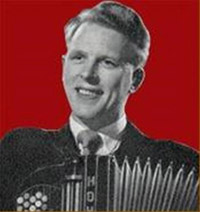 J.F.: How famous was he? Did people recognise him in the street? J.F.: How famous was he? Did people recognise him in the street? S.M.: I am not so sure about that. Not many people had TV in those days. He played mostly on BBC radio - usually live as there was much less pre-recording. He stood in front of the audience or the microphone and played live - fantastic! His broadcasts were frequent and people knew him because of that, which made him a celebrity and he topped the bill wherever he went. J.F.: And was he written about in newspapers and magazines? S.M.: Yes indeed he was! J.F.: This was in the late 1940s and early 1950s. What was it like later, as a teenager, to be the daughter of a famous musician? S.M.: He inspired me so much that I wanted to perform. But I did not want to perform on the accordion. That was not for me. I learned the piano and I practiced and practiced the piano! And I became quite good. I think daddy was hoping that I would become a pianist, but then singing took over and acting. I liked acting. I got in to the Webber Douglas School of Singing and Dramatic Art and I learnt to sing there. This was absolutely my own choice - my father never pushed me in any direction. 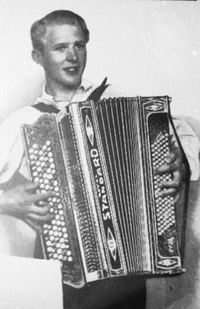 J.F.: How much was he away from home? J.F.: How much was he away from home?S.M.: He was away quite a lot. Mummy and I had to find things to do but she stayed at home with me while I was a school girl. My mother worked for a while in the music shop in Shepherd's Bush, 'Tollefsen and Neilsen'. Nils Neilsen was an accordionist and accordion repairer and daddy went into business with him. He lived and mended accordions upstairs on the first floor and we had the shop on the ground floor. We did not live there. At that time we lived in a flat in Kingston upon Thames, Cromwell Court which was near to Richmond Park. Sometime after we came back to Norway in 1961 I auditioned for the Norwegian Opera and before that I was fortunate to get a part in a production of 'My Fair Lady' at the Oslo Nye Theater. That was in 1962 and was great fun. The audition for the opera house was successful and I became a permanent member of the company choir and also did small solo parts in between. I had a good salary and that was great. But then I met Arne and we got married and started a family. When I was expecting our second child, the stress of rehearsals during the day and performances in the evening became too much. In 1972 I left my permanent position at the opera and became freelance although I maintained connections with the opera and worked for them off and on until 1984. 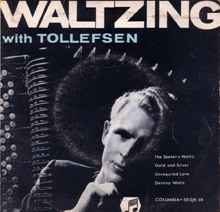 J.F.: Did your father's very strong religious views affect you? J.F.: Did your father's very strong religious views affect you?S.M.: Only in a very positive way. I knew that he had problems with stress and that he used strong medicines. The chemist had actually warned him against them. When he came back from his American tour he found Christian Science. My mother thought he was mad, crazy, but we started to go to the First Church of Christ Scientist in Kingston upon Thames. I was 11 - 12 years old and I enjoyed the Christian Science Sunday School much more than I had the Church of England. I liked Christian Science and I have actually studied both Mary Baker Eddy's book and the texts of the Bible. I read a new subject each week in her book along with the corresponding text from the Bible. It has helped me a great deal in my life and I am deeply grateful for that to my father. 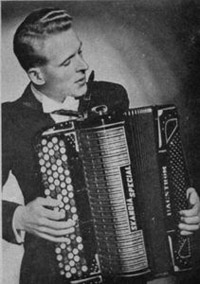 J.F.: Did this ever exclude you from anything you wanted to do? J.F.: Did this ever exclude you from anything you wanted to do?S.M.: Oh no. It has enriched my life, helped me and given me strength. It is a wonderful religion that teaches you mental discipline. But when my daddy passed away we went to church less often and now no more. He was the first reader in the church but my mother was less enthusiastic and I am sorry to say that there is now no longer a congregation in Norway. In the First Church of Christ Scientist in Oslo my father and I were on the music committee and he composed many wonderful songs for the church. My two girls alternated in playing the organ and I sang the solos. It was great fun because he came with new solos almost every week. "I have got a new song - would Sandra or Heidi play it?" It was very inspiring and of course the texts were mostly from the Bible. My daddy also had a good singing voice himself. 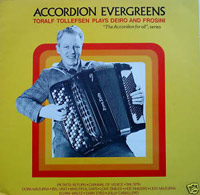 J.F.: How did you feel about your relation with Norway and England? Are you mostly English or Norwegian? J.F.: How did you feel about your relation with Norway and England? Are you mostly English or Norwegian?S.M.: I have always felt half and half. I adore Norway and I love England, and yes the United Kingdom also! I have a strong UK part in me. My mother was an orphan from the First World War as you know and was brought up in Belfast in Northern Ireland. After the war she took me to Northern Ireland and we visited her childhood home. Her foster mother had passed away but her foster father was still alive. I remember him sitting in a rocking chair and teasing me a lot! This was the only trip and we did not go again. My mother had no other family and she left her foster parents when she was 15. She went to London and formed a singing and dance act with another girl. Eventually she formed a trio with two other girls, 'The Shine Sisters', as they became known. But my mother gave up her career as you know to go with daddy to Australia. 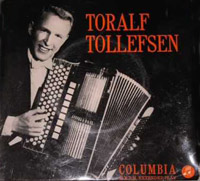 J.F.: What kind of people did you meet as a family? J.F.: What kind of people did you meet as a family?S.M.: We did not have a big social life. My father was engrossed in his own music and did not socialise with musician colleagues much. He kept himself to himself and his friends were mostly members of the church. J.F.: You were born in Norway at the beginning of World War II. Do you remember anything from those years? S.M.: I remember vaguely the German soldiers walking around where we lived and taking over the local school. We lived in my grandparent's house and I remember there were rifles hidden in the house because I know my grandfather was in the resistance movement. I remember the food shortage and that he was good at obtaining food for us. He kept pigs in the garden and cured them in the cellar. J.F.: When did you return to London? S.M.: In 1946 and I was between 6 and 7 years old. I remember the difficulty I had learning to speak English. I could understand but was not able to speak well. The problem was soon overcome when I began to play with other girls. But then I had to start school. In Norway children do not start school until they are seven and in England they begin at five. 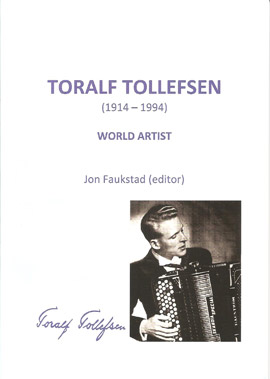 I was a tall girl for my age and was always one or two years older than my class mates throughout my school days, which was difficult. At the age of 11-12 my parents sent me to a private school in which half the day was spent on ordinary subjects and the other half on singing, dancing and drama. I enjoyed this very much. Then when I was 13 I was sent to a boarding school which I hated but I had to stay until I was 15. It was only half an hour's bus ride from home and I normally went home at weekends. In my second year I had to stay weekends while my mother was with my father on tour. I was so miserable that they took me away and I finished school at 15. When I left school I went to the Webber Douglas School of Singing and Dramatic Art in South Kensington for two years. I learnt to sing there and when I left I spent a period travelling around with another girl pianist singing in working men's clubs. I did not like this and took a job demonstrating and selling washing machines and refrigerators in Regent Street. During this period I became a part-time student at the Guildhall School of Music and Drama in London. J.F.: Your father told me that it was a difficult time for him when he went back to England after the War. Many variety theatres had disappeared and touring companies as well and his career could not continue in the same way. S.M.: It was not as easy as in the 1930s. Many theatres in local towns had closed and touring companies for which my mother and father had worked were gone. Wireless had taken over and my father's career changed direction. He worked a lot on BBC radio shows but he also sought to promote himself with the use of his accordion for classical recitals. It was his childhood dream to be a complete musician and not just a variety act. He always appeared in a black tail coat and evening dress like other classical musicians and resisted producers who asked him to use fancy dress. But this was difficult because although he had agents he had to pay for the hiring of halls himself. When he gave a concert at the Royal Albert Hall it led to financial problems. He had sold our house in New Malden which was rented out during the War and he bought a flat on Kingston Hill. In our last three years in England we moved to a house in Cranes Park Crescent in Surbiton. Daddy named it Tollheim after his composition Tollheim Polka'. 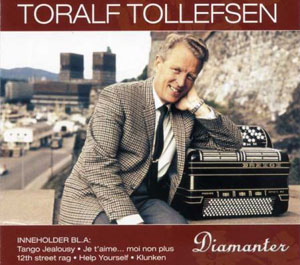 J.F.: What was it like to come back to Norway when you were 21 years old? J.F.: What was it like to come back to Norway when you were 21 years old? S.M.: It was somewhat different to living in London and needed a bit of adjustment as I did not know many people. We moved to a flat together. I did not consider staying in London because I wanted to be near them. We were a close family. J.F.: Was the move back to Norway a long planned decision or a kind of impulse act? S.M.: I think daddy began to feel he was not getting enough work and there was not enough inspiration in Britain, so he wanted to try out his concert work in Norway and use it as his base for foreign tours. As you know he also moved into teaching which I think he enjoyed as well as the regular salary he obtained from it. J.F.: Did you perform together with your father when you came back to Norway? S.M.: Yes we did, in an accordion TV programme. We performed the famous Largo, 'Ombra mai fu', the opening aria from Handel's opera 'Xerxes', and also a well-known aria from Bizet's 'Carmen'. 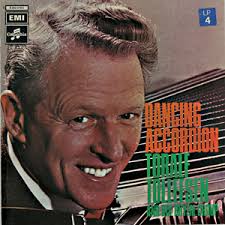 J.F.: Finally can I ask you, looking back, how do you see your father's legacy and the accordion? J.F.: Finally can I ask you, looking back, how do you see your father's legacy and the accordion?S.M.: I look back, as I believe my daughters do, with pride as I would like to think that with all the changes in entertainment and music his work was more than ephemeral. He inspired Mogens Ellegaard and took a great interest in his activities, and he encouraged him and others like Matti Rantanen in the development of new repertoire. He himself tried out various developments of accordions in the last decade or so of his life - the nine row left hand, the convertor system and the left hand with no stradella chord system, and he taught them and even produced a tutor book for free bass. But above all it was his love of music and musicianship that I loved and grew up with. He showed what an accordion sounded like in the hands of a true musician, which has inspired many. I sincerely hope also that his many compositions will continue to be played because they indicate his wonderful style of playing. I did not think I could ever play the accordion like he did but he inspired me to want to make music, one of the most enriching things of life. My father and his music is for me and my family a treasured memory. J.F.: Sonja I too benefitted from your father's encouragement in my own career like many others. Thank you for sharing your memories with me today. |